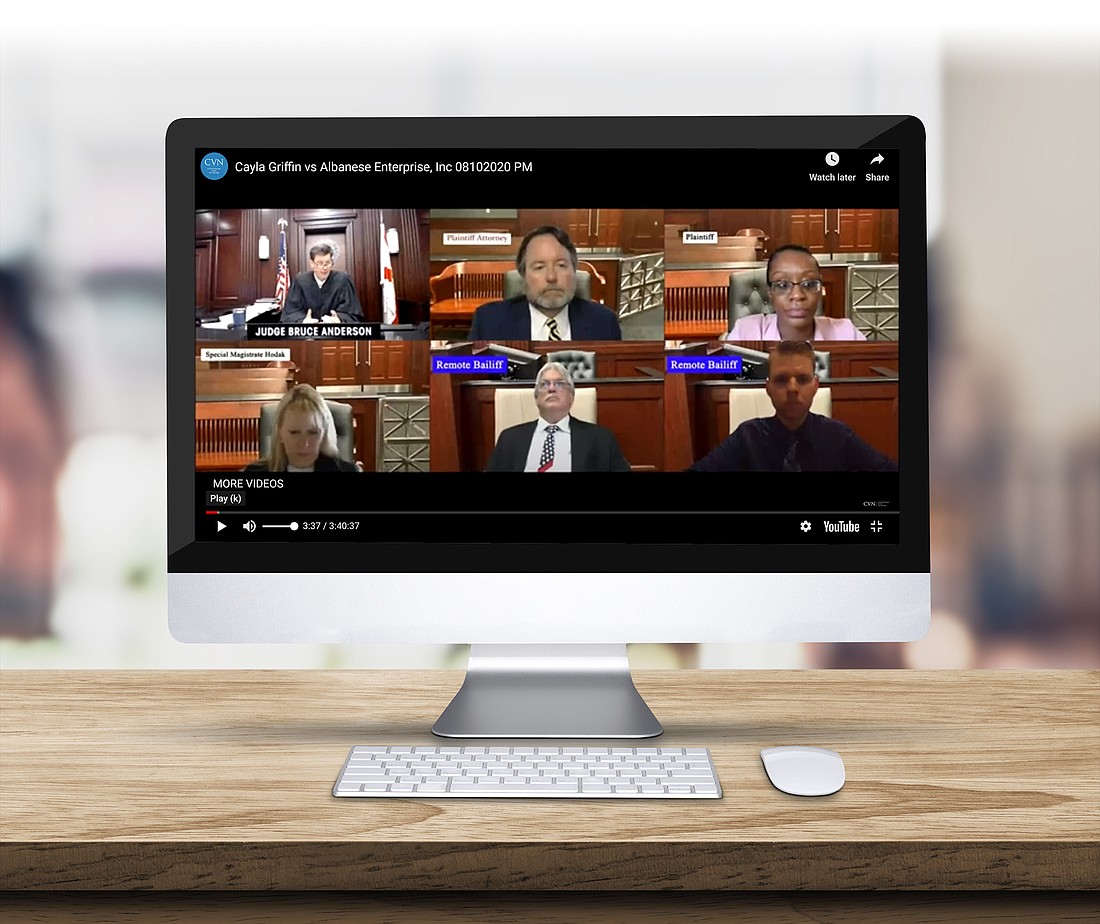
By Bruce Anderson, 4th Circuit Judge
In response to the health crisis presented by the COVID-19 pandemic, all jury trials in the State of Florida were suspended as of March 16 by Administrative Order of the Florida Supreme Court.
Three months later, the 4th Judicial Circuit was one of five circuits selected to test the feasibility of remote technology as a safer alternative to traditional in-person civil jury trials.
A workgroup was formed and directed to conduct and test fully remote jury trial procedures that balanced the health, safety and goals of all justice stakeholders, and yet replicated the environment, decorum and respect of the traditional in-person jury trial that is familiar to the citizens of this state.
The 4th Circuit conducted two fully remote and binding civil jury trials with the participating parties’ consent.
The first, Griffin v. Albanese Enterprise Inc. d/b/a Paradise, was a damages-only trial to determine the plaintiff’s personal injuries and damages arising from a tortious battery.
The second trial, Mathis v. Argyros, resolved a fee dispute between an attorney and his client for representation in a criminal matter.
Both trials were completed and resulted in binding verdicts.
The two remote jury trials required the 4th Circuit to build a platform to fulfill the fully-remote mandate while accommodating the varying technological capacities of the jurors and courthouse stakeholders.
The remote trial process and procedures detailed in the workgroup’s final report to state Supreme Court Chief Justice Charles Canaday were the result of a significant and coordinated effort by volunteer stakeholders who mock-tried practices and procedures before the jurors were summoned for the first remote and binding civil trial.
Based upon the workgroup’s experiences, the fully remote process provided several positive benefits.
For example, the Clerk of Courts office noted that the response rate for jurors to the remote jury summonses was higher than the average response rate experienced for in-person jury summonses before the pandemic.
In developing the jury selection process, the court technology officers and clerk’s office created an electronic questionnaire process that was completed before jury selection. The process allowed the court and the trial attorneys to focus their voir dire questioning after the panel of potential jurors “entered” the remote courtroom.
Post-trial surveys of participants revealed favorable experiences with the remote process.
The trials were conducted fully remote with only myself and a single court technology officer being in Courtroom 601 at the Duval County Courthouse, while all other participants to the trial appeared through the Zoom platform.
Making the trials available online through Courtroom View Network provided the public access to the proceedings in a convenient format and without requiring members of the public to enter the physical courthouse, avoiding the public health concerns associated with bringing large numbers of participants into the courthouse.
Notwithstanding the successful implementation of the Zoom platform to conduct the fully remote jury trials, the process was not without its challenges.
The “final product” was the result of a labor-intensive effort that exceeded those efforts required for a traditional in-person trial.
Replicating a fully remote process for additional jury trials requires a substantial commitment by the judicial stakeholders in any circuit, and in my opinion, an all-remote process would not be scalable for wholesale implementation.
Nonetheless, when balancing the benefits of the remote process with the logistical impediments of scalability, it is my opinion that a hybrid jury trial process is a realistic and feasible option for conducting civil jury trials if the restrictions of the pandemic persist.
Based upon the feedback of the participants and our experience conducting this pilot program, it is my opinion that a hybrid process comprising remote jury selection and an in-person jury trial would be a workable solution that balances the competing concerns of public health and the need to continue the civil justice system.
No judge, acting alone, could have built the methods, practices and procedures to successfully complete a binding fully remote civil jury trial.
The successful conclusion of the 4th Circuit’s project – numerous mock fully remote jury selections and jury trials, countless Zoom meetings, miles of email strings, two fully remote and binding civil jury trials and the 167-page report complete with more than 100 hyperlinks –is a testament to teamwork.
I am sincerely grateful to each member of our remote civil jury trial workgroup: Jacksonville American Board of Trial Advocates President Corinne Hodak; Jacksonville ABOTA member Angelo Patacca; Brian Corrigan, public information officer and senior manager, Duval County Clerk of Courts; and 4th Judicial Circuit Court Technology Officer Mike Smith and his staff – James Muse, Patrick Estalilla, Vince Paruolo, Larry Ashley and Pat Welsh.
I also especially acknowledge and thank the volunteers from the Jacksonville ABOTA chapter and the Chester Bedell Inn of Court for their service during numerous fully remote mock jury selections and trials between early June and early August.
I also thank the Jacksonville Public Library for generously supporting our project by allowing remote jurors without technology to participate in our remote jury trials by traveling to their choice of five branch libraries in Duval County.
The workgroup’s report to state Supreme Court Chief Justice Charles Canady and links to view each of the 4th Circuit’s two binding fully remote civil jury trials can be found at jud4.org on the Welcome Page.
Circuit Judge Bruce Anderson is leader of the 4th Judicial Circuit Remote Civil Jury Trial Pilot Project.